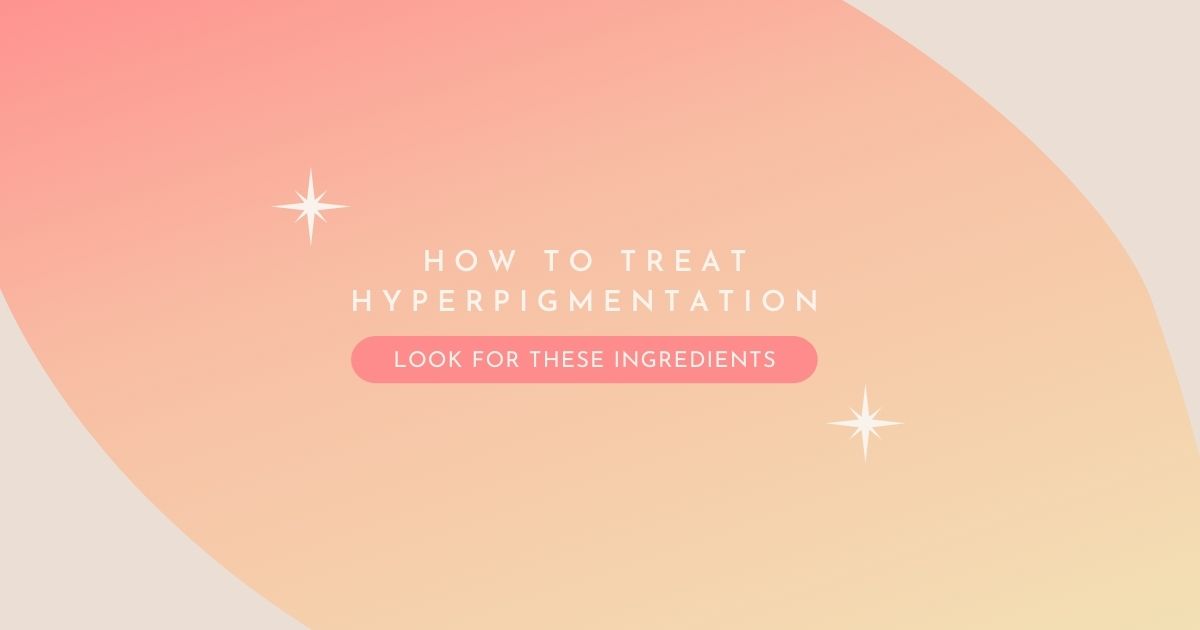Estimated Reading Time: 2 minutes
Hyperpigmentation is a skin condition where dark spots form due to an overproduction of melanin in skin. It is usually the result of acne. While hyperpigmentation can occur with any skin type or skin tone, those with medium to darker skin tones are more likely to be affected since their skin produces more melanin than those with lighter skin tones.
Hyperpigmentation may be difficult to treat but there are certain ingredients that can help speed up the healing process. Below you’ll find the right ingredients to look for, along with Korean skin care products to use to brighten those dark spots.
Glycolic Acid
Using products with glycolic acid is an effective way to treat hyperpigmentation. Glycolic acid (an alpha hydroxy acid) gets rid of dead skin cells, fights acne, evens out skin tone and fades dark spots.
If you’re new to glycolic acid, try I DEW CARE’s Berry Groovy Brightening Glycolic Wash-Off Mask. Use it weekly to gently exfoliate and brighten your skin. If you have mild acne, give the Green Plum AHA Bubble Toner by Beauty of Joseon a go.
For higher concentrations, try Isntree’s Clear Skin 8% AHA Essence. It’s formulated with 4% lactic acid and 4% glycolic acid to help unclog pores and lighten hyperpigmentation. For more intense exfoliation, Cos De BAHA’s G Glycolic Acid 10 AHA Serum is a great option.
Niacinamide
Niacinamide is a great ingredient to treat hyperpigmentation. It also keeps your skin barrier intact, regulates sebum production and minimizes the appearance of enlarged pores.
PURITO’s Galacto Niacin 97 Power Essence contains 5% niacinamide and 92% galactomyces ferment filtrate, which brighten skin and strengthen the skin barrier. RNW’s DER. CONCENTRATE Niacinamide Plus combines niacinamide, tranexamic acid and adenosine to reduce hyperpigmentation, restore your skin’s natural barrier and improve skin elasticity. For higher concentrations, ONE THING’s Niacinamide 10% Toner and CARE:NEL’s Niacinamide Zinc Serum are great contenders.
Retinol
If you find that most ingredients aren’t helping much when it comes to your hyperpigmentation, turn to retinol. Having tanned skin, I frequently deal with post-inflammatory hyperpigmentation, and I found that incorporating retinol into my daily skin care routine worked best for my skin.
Whether you’re concerned about hyperpigmentation caused by acne or sun spots, you can count on retinol to speed up cell renewal to fade dark spots over time. This ingredient not only combats dark spots, but also boosts collagen production, improves skin texture and skin tone, and diminishes the appearance of fine lines and wrinkles.
These products from COSRX, Cos De BAHA and NATUREKIND are worth adding to your wish list or shopping bag. You can also opt for NEOGEN’s Dermalogy Real Bakuchiol Firming Serum if you’re a beginner, or if you’re searching for a natural alternative to retinol.
Vitamin C
Vitamin C should be a part of your skin care routine if you’re dealing with hyperpigmentation. Although you shouldn’t rely solely on this antioxidant to completely fade your dark spots, Vitamin C can still treat hyperpigmentation as it inhibits the production of melanin. When used as a preventative measure, Vitamin C products help prevent existing dark spots from getting even darker.
It’s best to incorporate a Vitamin C serum in your morning routine since it’s packed with antioxidants and acts as a shield to block free radicals from damaging skin. By Wishtrend’s Pure Vitamin C 15% with Ferulic Acid and Pure Vitamin C 21.5% Advanced Serum are the most sought-after Vitamin C serums available at YesStyle. Check out this post for a full list of the best serums infused with this powerful ingredient that can transform a dull complexion into radiant skin.
Sunscreen
Physical sunscreens contain ingredients such as zinc oxide and titanium dioxide to reflect harmful UV rays, while chemical sunscreens contain ingredients such as avobenzone, octinoxate and oxybenzone to protect skin against UV rays.
Sun exposure, particularly unprotected exposure, can trigger or increase the production of melanin, which causes hyperpigmentation. Using any of the aforementioned ingredients would be pointless if you don’t use sun protection, so let this serve as your daily reminder to apply sunscreen and reapply when necessary.
Not sure which sunscreen is best suited for your skin type? Chapter 17 of the Beauty Book covers all the recommendations you need. There are also plenty of K-Beauty products that make reapplication a lot easier, even with makeup on. This post covers some tips worth following.






















